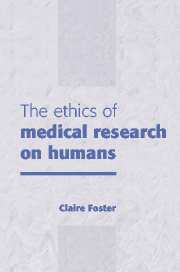Book contents
- Frontmatter
- Contents
- Foreword by Professor Sir David Weatherall
- Acknowledgements
- 1 An introduction to the ethical issues
- 2 Goal-based morality: scientific rigour in research
- 3 Duty-based morality: acting in the research subjects' best interests
- 4 Right-based morality: respecting the autonomy of research participants
- 5 From principles to practice
- 6 Case studies of goal-based issues
- 7 Case studies of duty-based issues
- 8 Case studies of right-based issues
- 9 A framework for ethical review: researchers, research ethics committees, and moral responsibility
- References
- Index
2 - Goal-based morality: scientific rigour in research
Published online by Cambridge University Press: 15 August 2009
- Frontmatter
- Contents
- Foreword by Professor Sir David Weatherall
- Acknowledgements
- 1 An introduction to the ethical issues
- 2 Goal-based morality: scientific rigour in research
- 3 Duty-based morality: acting in the research subjects' best interests
- 4 Right-based morality: respecting the autonomy of research participants
- 5 From principles to practice
- 6 Case studies of goal-based issues
- 7 Case studies of duty-based issues
- 8 Case studies of right-based issues
- 9 A framework for ethical review: researchers, research ethics committees, and moral responsibility
- References
- Index
Summary
The foundations of goal-based thinking
Research should aim to maximize health and minimize harm
A major issue to consider, if we want to know whether a research project involving human subjects is ethical or not, is what the research is aiming to achieve. If its outcomes are useful to medicine in that they maximize health whilst minimizing any harm, and the research is capable of achieving those outcomes, then, it could be argued, it is morally obligatory that it is undertaken.
The philosophical idea that underpins this argument is that the proper aim of humankind is to maximize happiness. The idea's classical formulation is known as utilitarianism. This is an approach to decision-making that has a place by right in our consideration of research, since research is about seeking and finding goals, or outcomes. Hence it is important to understand the implications of trying to maximize happiness. In what follows we will consider this approach to moral thinking, and discuss its origins, strengths and weaknesses. In so doing we will see in which ways the approach can be genuinely useful to the ethics of research, and in which ways detrimental.
Utilitarianism's strengths and weaknesses
Utilitarianism is a method of moral thinking which considers an action's consequences to be the determinant of whether the action itself is right or not. This method was first applied to practical problems by Jeremy Bentham (1748–1832).
- Type
- Chapter
- Information
- The Ethics of Medical Research on Humans , pp. 13 - 30Publisher: Cambridge University PressPrint publication year: 2001



